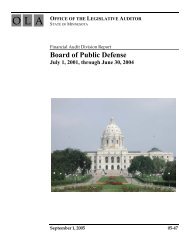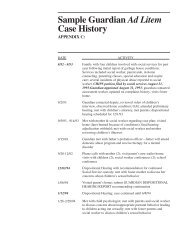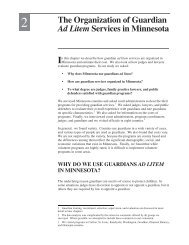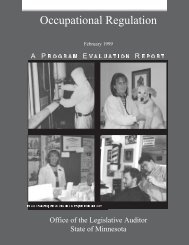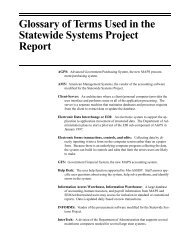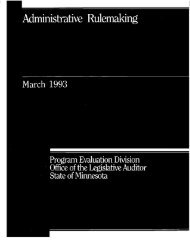Full Report (PDF) - Office of the Legislative Auditor
Full Report (PDF) - Office of the Legislative Auditor
Full Report (PDF) - Office of the Legislative Auditor
- No tags were found...
Create successful ePaper yourself
Turn your PDF publications into a flip-book with our unique Google optimized e-Paper software.
Discussion andRecommendationsCHAPTER 4Chapter 1 illustrates <strong>the</strong> wide variety <strong>of</strong> systems used by o<strong>the</strong>r states to registerand title motorvehic1es and to renew drivers'licenses. To provide accessto <strong>the</strong> public, states supplement <strong>the</strong> centml <strong>of</strong>fice by using statebranch <strong>of</strong>fices, county or municipal <strong>of</strong>fices, or private agents. Some states useonly one <strong>of</strong> <strong>the</strong>se types, while o<strong>the</strong>r states, including Minnesota, use various combinations.In this chapter, we examine <strong>the</strong> implications <strong>of</strong> our findings on <strong>the</strong> design<strong>of</strong> Minnesota's system. We discuss <strong>the</strong> use <strong>of</strong> public and private agents, stateregulation, fee policy, and corporate sales, and we make recommendations.PUBLIC VS. PRIVATEProponents <strong>of</strong> an all-public system contend that <strong>the</strong> private deputy registrars makelarge pr<strong>of</strong>its and that replacing <strong>the</strong>m with public deputy registrars would provideadditional revenue that could finance o<strong>the</strong>r programs or reduce taxes. Proponents<strong>of</strong> an all-private system contend that private deputies are more efficient and providebetter service than public deputies.Nei<strong>the</strong>r publicnor privatedeputies have aclear advantagein customerservice.We found that many private deputy registrars, particularly large deputies, do wellfinancially, but this does not necessarily mean that replacing <strong>the</strong>m with publicdeputies would save <strong>the</strong> taxpayers money. While we found that many public deputyregistrars made money for <strong>the</strong>ir city or county, <strong>the</strong>re were many o<strong>the</strong>rs, particularlysmall deputies, who lost money. Minnesota has 44 public deputy registrarsthat process less than 24,000 transactions per year. We found that 67 percent <strong>of</strong>our sample deputies from this group would have lost money even if <strong>the</strong> 1993driver's license fee increase had been in effect. If a county or city cannot providedeputy registrar services at a reasonable cost, private deputies give <strong>the</strong> public ano<strong>the</strong>roption for providing those services. In 1992, Goodhue County closed itsdeputy registrar <strong>of</strong>fice in Red Wmg and appointed a private agent because it waslosing money and because many citizens complained about <strong>the</strong> service. Our resultssuggest that under <strong>the</strong> current system, replacing private deputies with publicdeputies would tend to cost public resources for small deputy registrars and tendto save public resources for large deputies.Customer service also needs to be considered when comparing public and privatedeputy registrars. Ovemll, we found that nei<strong>the</strong>r public nor private deputies havea clear advantage in customer service. Private deputies have slightly better hours,but public deputies have slightly lower error rates. Customer waiting times are



